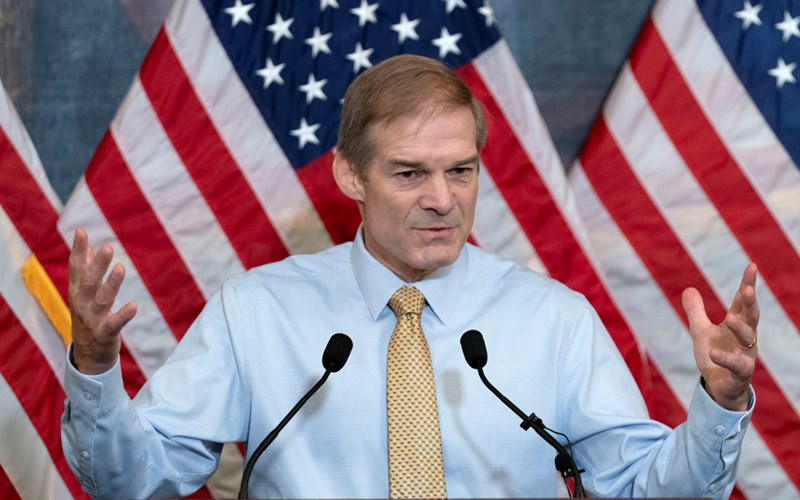House business had essentially grounded to a halt after former Speaker Kevin McCarthy was ousted on Oct. 3. A Nov. 17 deadline to fund the government and avoid a shutdown is looming. After weeks of division, Republicans solidly backed Johnson who is believed to be the first leader they've elected unanimously in 12 years.
As business resumes, it's likely to have a different feel – that's according to another well-known conservative in the House.
"Mike alluded to his [leadership] style yesterday in his comments in front of the House," Rep. Jim Jordan (R-Ohio) said on American Family Radio Thursday. Jordan was an early contender for the Speaker's post but was unable to garner the necessary support before dropping out.
"When he said he wants to empower committee chairmen, he wants to work with the entire Congress, both [with] Republicans and where we can find some common ground with Democrats … I think that's the proper approach to the job," the Ohio congressman told show host Jenna Ellis.
In his closing remarks after Wednesday's vote, Johnson was strong in his belief that both parties need a say in governance.
"I've made a commitment to my colleagues here that this Speaker's office is going to be known for decentralizing the power here. My office is going to be known for members being more involved and having more influence in our processes and all the major decisions that are made here for predictable processes and regular order. We owe that to the people," he said.
Republicans have also elected a House leader with history of support for pro-life issues.
A native of Shreveport, La., Johnson was born to an unwed 17-year-old mother a year before the Supreme Court's landmark 1973 Roe v. Wade decision that made abortion the law of the land in the U.S. Johnson has described his mother's experience as the foundation for his pro-life position. In spite of encouragement from friends to consider abortion for an unplanned pregnancy, Johnson's mother and father chose to begin a family.
"With the election of Mike Johnson, our nation has one of the strongest Christian and social conservative advocates we could have hoped and prayed for. He is one of the strongest voices and hardest workers protecting the lives of the pre-born. He also stands in the gap to protect families and children from radical transgender ideology," Craig DeRoche, president and CEO of Family Policy Alliance, said.
Family Research Council president Tony Perkins predicts that a good number of Democrats will meet Republicans halfway and accept Johnson's offer to share in decision-making.
He compared Johnson's remarks to those of Minority Leader Hakeem Jeffries, who pointed at Republicans and charged them with "election denialism" when he praised Joe Biden's "great" work in Jeffries' assessment of the "state of our democracy."
In contrast, Johnson's was a much more "unifying message," Perkins said. "He didn't compromise any principles, but he wasn't trying to pick a fight. Here's my prediction: Not only will Speaker Johnson be able to unify Republicans, but I think you're going to see some Democrats – not all, but some – in some of these efforts to advance commonsense, practical legislation."
Funding on the radar, but impeachment inquiry hasn't gone away
The funding battle is front and center on everyone's radar, and it may not be as dire as some believe. As Rep. Andy Harris (R-Florida) pointed out on Washington Watch on Oct. 5, four bills passed by the House before McCarthy's ouster account for 60% of discretionary spending.
"If the Senate would move on a defense appropriation bill, I think we could go to conference pretty quickly [after a speaker is elected] and at least take care of our troops, so that they're not involved in a continuing resolution if we should need one in the middle of November," Harris said at the time.
While the funding process attracts attention, the impeachment inquiry into President Joe Biden, investigations into the weaponization of government, and other Republican initiatives haven't gone away.
Regarding the impeachment inquiry, "We haven't missed a beat there," Jordan said Thursday. "Some of the public things have slowed down, but we've done three depositions this week."
One of those depositions was with a U.S. attorney from Pittsburgh who was a sort of clearinghouse for all of Hunter Biden's business dealings in Ukraine. "We've had some very productive interviews with individuals this week," Jordan said.
Rep. Johnson was a member of both the Judiciary Committee and the Select Subcommittee on the Weaponization of Government – both chaired by Jordan.
"He understands the importance of the work we're doing," Jordan continued, "and I think he'll continue to be real supportive of us getting the facts and the truth for the American people. That's our job. That's part of our constitutional duty to provide oversight and get those facts for the country."
Those initiatives aren't up against the clock, so funding will be the first priority, the Ohio lawmaker added. A continuing resolution has been discussed in Republican conference, but it would be a CR that stretches pretty far into 2024.
Budget-cut trigger may motivate Democrats
Jordan believes Democrats will be motivated to come to the table by a provision that was part of this year's debt ceiling agreement that calls for an automatic 1% funding cut if appropriations bills aren't completed by April 30.
"That happens across the board, and I believe the potential for that cut will be the incentive," Jordan said.
The first step is getting the long-range CR passed. That would allow for bills to be considered individually on their own merit as opposed to "one big, ugly omnibus spending package that typically gets thrown on our desk on Christmas Eve," Jordan said.
"We need to actually do the individual bills like we're required to under the rules, under the law, to pass those 12 appropriations bills. When you go in bill by bill, you have a much better chance to get the kind of policy in there that I think would be good for the country, like the kind of things we need to do on the border, the policy questions that come in those," Jordan said.







